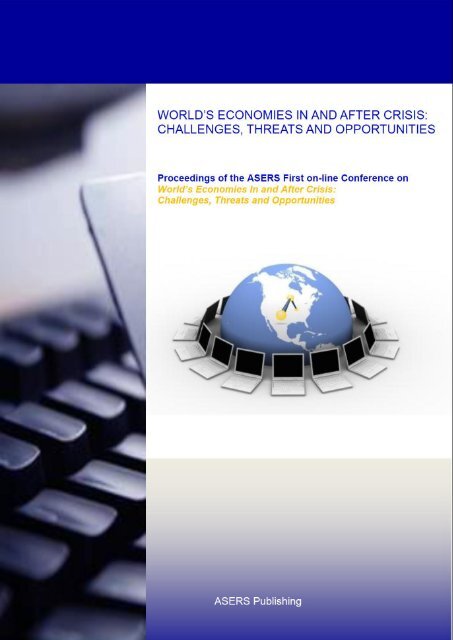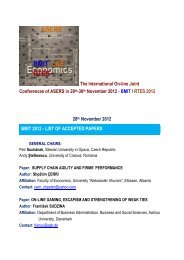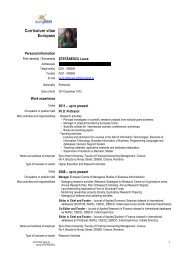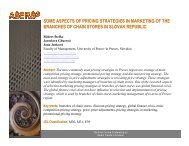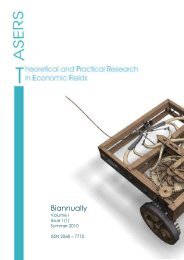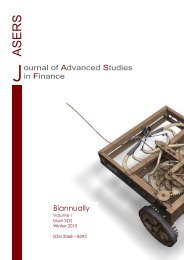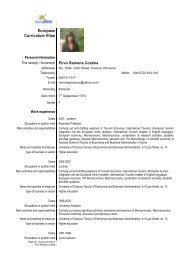eBook of Abstracts - ASERS
eBook of Abstracts - ASERS
eBook of Abstracts - ASERS
You also want an ePaper? Increase the reach of your titles
YUMPU automatically turns print PDFs into web optimized ePapers that Google loves.
“World’s Economies In and After Crisis: Challenges, Threats and Opportunities”<br />
The First Online International Conference on<br />
“World’s Economies In and After Crisis: Challenges,<br />
Threats and Opportunities”<br />
29 th May, 2009<br />
e-BOOK <strong>of</strong> ABSTRACTS<br />
The Deployment and Exit from Unconventional Monetary Policy in the<br />
Wake <strong>of</strong> the Global Financial Crisis: Evidence from Egypt<br />
Monal Abdel-Baki,<br />
The American University in Cairo, Egypt<br />
monalbak@aucegypt.edu<br />
Abstract:<br />
This research investigates the effectiveness <strong>of</strong> the utilization <strong>of</strong> unconventional or<br />
alternative policy measures by central banks in emerging market economies to cushion the blow <strong>of</strong><br />
the global financial crisis. The reason for resorting to these policies is the inefficacy <strong>of</strong> the traditional<br />
monetary tools in reviving the economy especially in cases where asset prices experience large<br />
haemorrhages or huge fluctuations. Yet, the alternatives to conventional monetary policy have<br />
generated heated debate among economists and policy makers alike, mainly with regards to their<br />
cost-effectiveness as well as to the price that the economy is apt to incur by exiting from these<br />
policies.<br />
The paper instigates by attempting to throw some light on the circumstances that have led<br />
to the adoption <strong>of</strong> these courses <strong>of</strong> action and explores the different types <strong>of</strong> unconventional<br />
monetary policies utilised to face these calamities. Unconventional tools mainly took the form <strong>of</strong><br />
utilising central banks’ balance sheets to expand interbank transactions on the money market and to<br />
furnish non-banking financial institutions as well as corporations with the much needed liquidity.<br />
Then, the paper elucidates that the Central Bank <strong>of</strong> Egypt did not resort to the costly tool <strong>of</strong> injecting<br />
equity into the balance sheets <strong>of</strong> Egyptian banks since they were decidedly sheltered from the global<br />
crisis. Next, the paper zooms into investigating the effects <strong>of</strong> the global economic downturn on the<br />
Egyptian economy and the efforts <strong>of</strong> both the fiscal and monetary agents in quelling the impact <strong>of</strong> the<br />
slowdown. In this context a dynamic stochastic general equilibrium (DSGE) model is estimated on<br />
data for Egypt taking into account the sources <strong>of</strong> major exogenous shocks, transmission<br />
mechanisms, and the level <strong>of</strong> its financial development. In addition to the central bank, the model<br />
comprises <strong>of</strong> five different agents: households, financial intermediaries, producers <strong>of</strong> goods and<br />
services, capital producers, and retailers. The latter are embedded in the model for the sole reason<br />
<strong>of</strong> introducing nominal price rigidities.<br />
The paper compares three different situations for which central banks can deploy available<br />
instruments. In the first case, the central bank can stabilize the exchange rate. The second rule<br />
assumes that the central bank is set to stabilize CPI inflation. Thirdly, tools <strong>of</strong> monetary policy are<br />
2
The First Online International Conference<br />
29 May, 2010<br />
used to stabilize core inflation. This study will expectantly provide a benchmark DSGE model<br />
incorporating features <strong>of</strong> middle-income countries, and hence could serve as a starting point for<br />
monetary policy analysis for these nations. The results <strong>of</strong> the research reveal that contrary to<br />
common expectations, emerging market economies (EMEs) such as Egypt benefit from such credit<br />
policies even if their interest rates are not zero bound.<br />
Subsequently, the methods and costs <strong>of</strong> exiting from these unconventional monetary policy<br />
tools are estimated and the paper shows how these unconventional tools <strong>of</strong> monetary policy and the<br />
consequent financial regulation overhaul have resulted in the permanent reordering <strong>of</strong> the<br />
instruments, institutions and aims <strong>of</strong> economic policy. Finally, after the consequences and risks<br />
involved are evaluated, the research culminates in proposing a comprehensive roadmap comprising<br />
<strong>of</strong> financial overhaul as well as the deployment <strong>of</strong> a set <strong>of</strong> unconventional monetary policy measures<br />
especially with the recent orientation <strong>of</strong> monetary policy to the broader issues <strong>of</strong> financial stability,<br />
and not solely price stability. This blueprint is apt to prove helpful for other emerging economies <strong>of</strong><br />
similar circumstances to Egypt.<br />
Keywords: monetary policy, interest rate policy, monetary transmission mechanism,<br />
nonconventional monetary policy, balance sheet policy, public borrowing, exit<br />
strategies.<br />
JEL Classification: E40, E50, E52, E58, E60.<br />
Alterations in Monetary Transmission Mechanism in Egypt<br />
in the Wake <strong>of</strong> the Triple - F Crisis<br />
Monal Abdel-Bakii<br />
The American University in Cairo, Egypt<br />
monalbak@aucegypt.edu<br />
Abstract:<br />
At the turn <strong>of</strong> the century, the global economy was exposed to soaring food and fuel<br />
prices, in addition to the viscous blow <strong>of</strong> the global financial crisis. All three effects, concurrently<br />
dubbed the “Triple-F Crisis”, have altered the channels <strong>of</strong> monetary transmission mechanism<br />
(MTM) in most nations. Being the largest wheat importer in the world with a yearly import burden <strong>of</strong><br />
six million tonnes, the impact on the Egyptian economy was especially agonizing. This research<br />
explores the efficacy <strong>of</strong> the Egyptian monetary agent in cushioning the blow <strong>of</strong> this multi-facade<br />
crisis by focusing on the two most significant MTM channels for Egypt, namely the interest rate and<br />
exchange rate channels.<br />
The research instigates by investigating the effects <strong>of</strong> the crisis on the Egyptian economy<br />
and the attempts <strong>of</strong> the Central bank <strong>of</strong> Egypt (CBE) to quell the impact <strong>of</strong> the slowdown. A<br />
Structural Vector Autoregressive (SVAR) model estimates the extent <strong>of</strong> internal and external<br />
shocks. The main contribution <strong>of</strong> the paper is the introduction <strong>of</strong> the expectations channel based on<br />
a field survey administered for a period <strong>of</strong> 21 months. This inclusion is essential especially in view<br />
<strong>of</strong> the pessimism about future inflation and the impending gradual removal <strong>of</strong> petroleum subsidies<br />
by the Egyptian government.<br />
The results <strong>of</strong> the study suggest that the CBE has to use a combination <strong>of</strong> tools to restrain<br />
inflation while simultaneously boosting output. This can be achieved through expanding the<br />
monetary base using open market operations (OMO) and maintaining an appreciated domestic<br />
currency. Since cutting interest rates will have mild effects on output and a lagged and moderate<br />
3
“World’s Economies In and After Crisis: Challenges, Threats and Opportunities”<br />
impact on inflation, the CBE is not highly encouraged to resort to this policy. In view <strong>of</strong> the<br />
backward-looking price expectations, the immediate goal <strong>of</strong> the CBE has to be price stability.<br />
Hence, the research does not only demonstrate the inability (CBE) to effectively mitigate the friction<br />
inflicted by the pessimistic inflationary expectations, but it also reveals that some <strong>of</strong> the policies that<br />
it currently employs need to be adjusted to enhance the efficacy <strong>of</strong> monetary shocks.<br />
One last point to mention is the bearing <strong>of</strong> future policies. The results <strong>of</strong> the study indeed call<br />
for the persistence <strong>of</strong> a managed float, currently geared towards appreciating the Egyptian pound in<br />
order to make the price <strong>of</strong> imported wheat less costly. Yet, this has to be enacted through building<br />
an exchange rate system benchmarked against the currencies <strong>of</strong> the major trade partners <strong>of</strong> Egypt<br />
instead <strong>of</strong> the US dollar. Second, since the expectations <strong>of</strong> Egyptians act as a barrier to enhancing<br />
the pass through effects on the economy, more transparency and public outreach are urgently<br />
required. Also, as the Egyptian Exchange remains unstable and rudimentary, the CBE must seek to<br />
use monetary policy to direct credit to sectors regarded as central to the macroeconomic<br />
development strategy. Finally, future research is encouraged to further broach the expectations<br />
channel, and to investigate the changes that the Triple-F Crisis may have brought to other MTM<br />
channels, such as the balance sheet channel, especially in view <strong>of</strong> the relentless efforts <strong>of</strong> the CBE<br />
to settle non-performing loans.<br />
Keywords: triple-F crisis, inflation targeting, interest rate policy, foreign exchange intervention,<br />
monetary transmission mechanism.<br />
JEL Classification: E40, E52, E58, F31.<br />
Is the Crisis Bad or Good for the Environment<br />
Cristina Barbu<br />
Spiru Haret University, Romania<br />
cristina_barbu2000@yahoo.co.uk<br />
Abstract.<br />
Over the last twenty years Romania’s economy has grown. Many zones have reduced<br />
poverty and improved education. During the last two years, industrial production has been affected<br />
by the crisis.<br />
There are both immediate and long-term positive and negative environmental implications <strong>of</strong><br />
the crisis. Some <strong>of</strong> researchers think that the decline in production will automatically lead to a lower<br />
level <strong>of</strong> pollution. On the contrary, other researchers think that the problem <strong>of</strong> pollution may become<br />
worse during the crisis period.<br />
In our country, environmental protection seems to have a lower priority but the sustainable<br />
development is no longer a “choice.”<br />
Keywords: environment, sustainable development, crisis.<br />
JEL Classification: D23, Q4.<br />
4
The First Online International Conference<br />
29 May, 2010<br />
Control and Maintenance Accounting <strong>of</strong> Information Systems<br />
Husnija, Bibuljica<br />
Faculty <strong>of</strong> Applied Science in Business, Pejë, Kosovo<br />
h_bibuljica@hotmail.com<br />
Abstract:<br />
One <strong>of</strong> the tasks <strong>of</strong> business entity is building and creating the information system, because<br />
in today's business environment is more than ever necessary to make proper and good quality<br />
business decisions. If we were a business decision and as efficiently as it is necessary that a<br />
business entity you easy distribution <strong>of</strong> your information in several parts.<br />
Therefore, this paper will therefore be focused on the concept <strong>of</strong> accounting information<br />
system as a part <strong>of</strong> total complex information systems. Upon the basis <strong>of</strong> the focus will continue to<br />
be words on the complexity <strong>of</strong> accounting system and also the mains functions <strong>of</strong> their management<br />
or managing business information within the system. While in the last part will be discussed in<br />
relation to maintain and control <strong>of</strong> one accounting information system because the system itself<br />
requires appropriate controls with adequate maintenance.<br />
Keywords: accounting information system, managing, internal controls, functionality, maintenance,<br />
information, decision.<br />
JEL Classification: M, M4, M41.<br />
Economic Crisis Impact on SMEs Policies concerning<br />
Sustainable Development Values<br />
Povilas, Brilius<br />
Kaunas University <strong>of</strong> Technology<br />
Faculty <strong>of</strong> Economics and Management, Lithuania<br />
povilas@baifoteka.com<br />
Abstract:<br />
Objective: Global economic crisis has demanded urgent actions from governments,<br />
enterprises and societies to effectively mollify consequences <strong>of</strong> negative economic growth and<br />
compensate the losses <strong>of</strong> competitive advantage. It is evident that unevenness in crisis impact will<br />
mostly affect the quality <strong>of</strong> existence <strong>of</strong> more vulnerable subjects and societies which will have their<br />
prospects <strong>of</strong> future damaged more than others. Sustainable development deals with the issue <strong>of</strong><br />
inequality: it is directed at enhancing economic, social and ecologic sustainability on a macro level.<br />
SMEs in the context <strong>of</strong> sustainability are playing more and more important role: their contribution to<br />
achieving sustainable development values is becoming vital. However, as economic crisis hits, there<br />
is uncertainty <strong>of</strong> how it affects SMEs policies regarding sustainable development values. Will SMEs<br />
remain committed to sustainability This paper aims at drawing conceptual grounds for evaluating<br />
possible impact <strong>of</strong> economic crisis on SMEs policies as far as sustainable development values are<br />
concerned.<br />
The methodology <strong>of</strong> investigations consists <strong>of</strong> system design. This paper is conceptual in<br />
nature. The approach adopted in this paper is first set to distinguish between several definitions<br />
concerning sustainable development and Corporate Social Responsibility (CSR) concepts. Further<br />
based upon the perspectives from extant literature on sustainable development and CSR, the author<br />
defines behavioural pattern <strong>of</strong> concepts <strong>of</strong> sustainable development and CSR. A system model is<br />
5
“World’s Economies In and After Crisis: Challenges, Threats and Opportunities”<br />
designed: its general actors are enterprise, sustainability and CSR. Basing his thoughts on scientific<br />
literature and using analytical approach the author defines the model for capturing economic crisis<br />
impact on system’s variables. The analysis <strong>of</strong> model unveils opportunities to spot economic crisis<br />
impact on system’s variables and thus to answer how economic crisis in general affects enterprises<br />
sustainability policies. In this place SME concept is introduced and the specifics <strong>of</strong> SME contribution<br />
to sustainability are defined. Finally, possibilities for applying introduced model for analysis<br />
economic crisis impact on SMEs policies concerning sustainable development values are discussed.<br />
Conclusions: sustainable development and CSR concepts have many affinities and therefore<br />
their interaction is observable. Under certain conditions CSR can be regarded as a substitution for<br />
sustainable development concept in the enterprise. The paper proposes that economic crisis impact<br />
on enterprise’s policies regarding values <strong>of</strong> sustainable development can be captured by analysing<br />
firm’s commitment to Corporate Social Responsibility activities. For such an analysis CSR monetary<br />
value function can be employed which model is provided by extant literature. One <strong>of</strong> the variables <strong>of</strong><br />
CSR monetary function is firm’s commitment to CSR activities which can be calculated by using<br />
multiple methods such as survey and firm’s equity analysis. For the case <strong>of</strong> SME, analysis <strong>of</strong> its<br />
CSR monetary value can be also applied, but the relations between CSR and sustainable<br />
development have to be defined in regard <strong>of</strong> specifics <strong>of</strong> SME contribution to sustainability. In<br />
general terms, economic crisis impact on SMEs policies concerning sustainable development values<br />
can be captured by using firm’s CSR monetary value function analysis.<br />
Keywords: economic crisis, sustainable development, SME.<br />
JEL Classification: Q01, M14.<br />
Neuroeconomics and Decision Making Process<br />
Mădălina Constantinescu<br />
Spiru Haret University, Romania<br />
constantinescu_madalina2002@yahoo.co.uk<br />
Abstract:<br />
Neuroeconomics has further bridged the once disparate fields <strong>of</strong> economics and<br />
psychology. The central thesis <strong>of</strong> the paper is that the development <strong>of</strong> behavioural economics in<br />
important respects parallels the development <strong>of</strong> cognitive science – Neuroeconomics has inspired<br />
more change within economics than within psychology because the most important findings in<br />
Neuroeconomics have posed more <strong>of</strong> a challenge to the standard economic perspective. The single<br />
most important source <strong>of</strong> inspiration for behavioural economists has been behavioural decision<br />
research, which can, in turn, be seen as an integration <strong>of</strong> ideas from cognitive science and<br />
economics. Neuroeconomics has primarily challenged the standard economic assumption that<br />
decision making is a unitary process – a simple matter <strong>of</strong> integrated and coherent utility<br />
maximization – suggesting instead that it is driven by the interaction between automatic and<br />
controlled processes.<br />
This paper reviews neuroeconomic research in areas <strong>of</strong> interest to both economists and<br />
psychologists: decision making under risk and uncertainty, intertemporal choice, and social decision<br />
making.<br />
Keywords: neuroeconomics, behavioural economics, affect, behavioural welfare economics,<br />
decision making, caeteris paribus.<br />
JEL Classification: A12, D81.<br />
6
The First Online International Conference<br />
29 May, 2010<br />
Banks to Reinvent to Rise from the Ashes <strong>of</strong> Global Meltdown<br />
Souren Ghosal<br />
Centre for Micr<strong>of</strong>inance Promotion, India<br />
sourenghosal@sify.com<br />
Abstract:<br />
Global meltdown should awaken financial institutions that open market and globalization<br />
may be as fatal and regressive if not more as closed markets and conservative policies pursued by<br />
some countries. It is imperative to learn from both visible and invisible impact <strong>of</strong> global financial<br />
collapse on the financial market both national and international. It is however strange to notice that<br />
instead <strong>of</strong> taking lessons from such a financial catastrophe there is not much in depth realization and<br />
re thinking to re invent and to identify an appropriate strategic move to avoid such catastrophe in<br />
future if not completely blocking its re-surfacing.<br />
It appears that still financial institutions look for global market and competitive edge to grow<br />
bigger than others both organically as well as inorganically. In India also the latest move for mergers<br />
and grow global have not only an individually adopted strategy <strong>of</strong> banks both in public and private<br />
sectors but also happens to be a declared policy decision <strong>of</strong> the state. Apparently it looks great to<br />
become big and globally competitive and therefore it highly enticed strategy <strong>of</strong> banks nay all<br />
institutions all over the world but in practical life it has proven to be fatal. This is evident from what is<br />
happening now and also what has happened in the past.<br />
Keywords: globalization, open market, crisis, policy decisions.<br />
JEL Classification: F02, F41, G15<br />
Protectionist Institutional Financial Crisis in Transition Economies in<br />
South Eastern Europe<br />
Armand, Krasniqi<br />
Prishtina University, Economic Faculty, Kosovo<br />
mandikrasniqi@gmail.com<br />
Abstract:<br />
The prevention and the minimization <strong>of</strong> the negative effects that have derived from the<br />
financial global crisis mainly lay down on governmental institutions through the implementation <strong>of</strong> the<br />
economic-legal measures which scientifically are also known as a state intervention. At least now,<br />
the logic <strong>of</strong> the broadened economic liberalization system has shown signs <strong>of</strong> apathy and<br />
inefficiency. Bail-out actions in South Eastern Europe ins<strong>of</strong>ar have not been stated clearly nor taken<br />
seriously. Due to the significance that this crisis constitutes it is required from governmental<br />
institutions rapidly to find and undertake the appropriate and effective monetary, financial and<br />
financial and legal policies aiming to bail out because even those that have reasoned the logic <strong>of</strong><br />
neo-liberal socio-economic system have rapidly adopted such measures.<br />
The role <strong>of</strong> the state intervention is not only inevitable but it is imperative and such actions<br />
are to be very specific, reasonable, effective and constructive. The primary outcome that derived<br />
from this situation is the fact that banks are creating a special relationship with the state. The role <strong>of</strong><br />
7
“World’s Economies In and After Crisis: Challenges, Threats and Opportunities”<br />
the state needs to be focused through integrated legal and economic policies, in course <strong>of</strong><br />
strengthening the banking system, credit market system, protection <strong>of</strong> investments, and amendment<br />
<strong>of</strong> the tax policies including the capital incentives. It is compulsory, as long as it is not too late, that<br />
the institutions <strong>of</strong> the Republic <strong>of</strong> Kosovo need to be much more committed in terms <strong>of</strong> establishing<br />
strategies against this crisis which as the last option would require immunizing the economic<br />
systems <strong>of</strong> countries attacked by the crisis.<br />
Key Words: global financial crisis, state intervention, neo-liberal economy, legislation, action plan,<br />
anti-crisis strategy.<br />
JEL Classification: F02, F41, G15, G38.<br />
The Link between Business Strategy and<br />
Corporate Social Responsibility: The Kosovo Case<br />
Berim Ramosaj 1 and Izet Zeqiri 2<br />
University <strong>of</strong> Prishtina, Economic Faculty, Kosovo 1<br />
SEEU, Faculty <strong>of</strong> Business Administration, Kosovo 2<br />
b.aziri@seeu.edu.mk<br />
Abstract:<br />
Social responsibility is one <strong>of</strong> the most <strong>of</strong>ten used terms now days by researchers,<br />
managers and ordinary people likewise. Corporate social responsibility is the obligation to take<br />
actions which simultaneously protect and improve the welfare <strong>of</strong> society as a whole, as well as the<br />
interests <strong>of</strong> the organization. According to this, managers must always strive not only to achieve their<br />
objectives but also the objectives <strong>of</strong> the society as a whole. Being socially responsible does not<br />
mean that the organization should abandon the economic reasons <strong>of</strong> its existence. On the contrary,<br />
the proper balance between being pr<strong>of</strong>itable and socially responsible must be found. Social<br />
responsibility and financial stability must be complementary, but also sustainable growth should<br />
always be kept in mind by the managerial teams.<br />
Social responsibility and managerial ethics, are considered either as the global practice,<br />
and competitive advantage, through which the organization performs successfully in the economic<br />
and in the social area. Even besides the wide usage in the developed world the concept <strong>of</strong> corporate<br />
social responsibility has still not found proper implementation in Kosovo. The issue <strong>of</strong> the<br />
interconnection between strategy and corporate social responsibility is one <strong>of</strong> the least studies<br />
issues in Kosovo. This paper presents an analysis <strong>of</strong> this relation. Environmental and ecological<br />
dimensions <strong>of</strong> social responsibility are excluded from the analysis and emphasis is placed on social<br />
and human dimension.<br />
Keywords: corporate social responsibility, business strategy, human dimension <strong>of</strong> social<br />
responsibility.<br />
JEL Classification: M14, L1.<br />
8
The First Online International Conference<br />
29 May, 2010<br />
Main Sources <strong>of</strong> Finance for Development: Retrospective View on the<br />
Evolution <strong>of</strong> Pre-Crisis Ideas<br />
Mikhail Anatolyevich Sherstnev<br />
Samara State Economic University<br />
Institute for Theoretical and International Economics, Russian Federation<br />
sherstnev@sseu.ru<br />
Abstract:<br />
Recent years were marked by growing attention to the role <strong>of</strong> finance in the process <strong>of</strong><br />
economic development. The topic is not new by itself and could be traced back to Marx, Schumpeter<br />
and Hicks with relation to the formation and development <strong>of</strong> the capitalist market economy. The<br />
modern research and relevant policy debate provide further insight into multifaceted issue <strong>of</strong><br />
development finance primarily in such two important areas as interrelationships between financial<br />
systems development and economic growth and the available sources <strong>of</strong> finance for development in<br />
the modern globalizing world.<br />
The present essay focuses on the second aspect <strong>of</strong> the research and policy debate – the<br />
range <strong>of</strong> sources <strong>of</strong> development finance. The United Nations Millennium Declaration opened the<br />
new horizons in the efforts <strong>of</strong> international community to alleviate poverty and speed up the<br />
economic, social and human development in the third world. It set out the number <strong>of</strong> certain goals<br />
which should be achieved within the predetermined time period. In 2003 the set <strong>of</strong> concrete<br />
indicators was agreed in order to monitor the progress towards Millennium Development Goals.<br />
Such ambitious development policy goals raise the question <strong>of</strong> the relevant financing mechanisms<br />
for their practical implementation. In accordance with the rough estimates <strong>of</strong> High Level Panel<br />
chaired by Mr. Ernesto Zedillo in 2001 the additional resources needed to meet the Millennium<br />
Development Goals only in the form <strong>of</strong> <strong>of</strong>ficial development assistance amount to $50 billion per year<br />
in comparison with the level achieved at the turn <strong>of</strong> the millennium. This caused subsequent<br />
important political debate and different initiatives in the area <strong>of</strong> financing the progress towards MDG.<br />
The essay further proceeds as follows. In part 2 we will examine the domestic sources <strong>of</strong><br />
finance and evaluate their potential impact on the development processes in the third world and<br />
transition economies. In part 3 we will turn to the external sources <strong>of</strong> financing and discuss some<br />
new financial initiatives which were put forward at the turn <strong>of</strong> the millennium to support the<br />
Millennium Development Goals. Finally, conclusion will provide the summary <strong>of</strong> major findings from<br />
our review <strong>of</strong> the issue.<br />
Keywords: economic development, sources <strong>of</strong> finance, financial initiatives.<br />
JEL Classification: E44, G1, G2, O1.<br />
9
“World’s Economies In and After Crisis: Challenges, Threats and Opportunities”<br />
Intelligent Agent Approach for Business Process Management<br />
Andy Ştefănescu<br />
University <strong>of</strong> Craiova, Romania<br />
andystefanescu@yahoo.com<br />
Abstract<br />
In recent years businesses around the world have been facing the challenges <strong>of</strong> a rapidly<br />
changing environment due to the development <strong>of</strong> business market and technology. As a result,<br />
organizations are paying more attentions to supporting business process management with the<br />
ability to adapt to the dynamic environment.<br />
Furthermore, business climate is changing from centralized and closed to distributed and<br />
open mainly by virtue <strong>of</strong> the proliferation <strong>of</strong> networks.<br />
Therefore, an agent-based approach is proposed in this research to manage complex<br />
business activities. In this approach, business activities are delegated to a number <strong>of</strong> autonomous<br />
agents. These agents may be human beings as well as machines or s<strong>of</strong>tware applications. Each <strong>of</strong><br />
them has awareness <strong>of</strong> situation and can make real-time decisions on activities.<br />
Keywords: business process management, real-time decisions, workflow<br />
JEL Classification: D81, L21, M1<br />
Using Process based Approach to support Business Reengineering<br />
Laura Stefanescu<br />
Spiru Haret University, Romania<br />
laurastef73@yahoo.com<br />
Abstract<br />
Market globalization, economic recession <strong>of</strong> many regions, new customer requests regarding<br />
the quality <strong>of</strong> products and services and the quick development <strong>of</strong> IT require new strategies for<br />
successful business. That is why many important organizations made considerable efforts to provide<br />
better value for the customers, first through applying the total quality management, and more<br />
recently through reengineering.<br />
Reengineering represents radical redesign <strong>of</strong> enterprise processes, especially economic<br />
processes. Instead <strong>of</strong> organizing the enterprise into specialized functional entities (such as<br />
production, accounting, marketing), the enterprise should be transformed, according to this theory,<br />
into a series <strong>of</strong> processes relevant to create value and to create strategies.<br />
The main objective <strong>of</strong> this paper is the process based approach as a main condition for<br />
rethinking the business processes, in order to obtain spectacular improvements <strong>of</strong> the indicators<br />
needed in performance appraisal, therefore reengineering.<br />
Keywords: reengineering, processes, performances, process map, modelling business process,<br />
tools for business modelling<br />
JEL Classification: C61, C63, O32<br />
10
The First Online International Conference<br />
29 May, 2010<br />
The Crises <strong>of</strong> the Credits and its Implications in Romania<br />
Laura Ungureanu<br />
Spiru Haret University, Romania<br />
ungureanu@lycos.com<br />
Abstract:<br />
Countries <strong>of</strong> Central and Eastern Europe have been extremely affected by the crisis, not<br />
only because they have suffered a decline in domestic demand and exports, but many <strong>of</strong> them<br />
suffering from the effects <strong>of</strong> depreciation relative to their foreign currency loans. In addition, access<br />
to external credit has been restricted and the costs rose. Finally, capacitive their exit from the crisis<br />
on account <strong>of</strong> public expenditures is extremely limited.<br />
Unfortunately, as seen fairly quickly in early 2009, Romania is not so simple as Western.<br />
Public investment looks good on paper, but their practical implementation requires administrative<br />
capacity, project managers and consistency in action. Romania faces its first economic crisis since<br />
the fall <strong>of</strong> communism, as its 2008 performance, with a record economic growth <strong>of</strong> about 9% in the<br />
first nine months <strong>of</strong> 2008, was significantly slowed down by the global financial crisis. European<br />
Bank for Reconstruction and Development (EBRD) has reduced its growth forecast for Romania this<br />
year from 1.3% to zero, considering that new measures to reduce the budget deficit will limit<br />
domestic demand.<br />
Under existing circumstances, in this paper we want to make an analysis <strong>of</strong> the current<br />
economy in Romania and debate the possible settlement to solve this.<br />
Keywords: crises, economic growth, credits.<br />
JEL Classification: E51, N1, R11.<br />
Support <strong>of</strong> Small - Medium Size Enterprises (SME) - Opportunity for<br />
Kosovo to Overcome Economic Crisis<br />
Fatos, Ukaj<br />
Faculty <strong>of</strong> Applied Science in Business, Pejë, Kosovo<br />
fatos_ukaj@yahoo.com<br />
Abstract:<br />
It is already common that economists accept that SME are engine <strong>of</strong> the economic<br />
development, and that this Part <strong>of</strong> national industry in most <strong>of</strong> the so called „East Europe “and<br />
developing countries, that is promoter <strong>of</strong> the private initiative and entrepreneur skills. SME have an<br />
advantage in it that are so flexible, they react quickly on market demand and they are adaptable on<br />
changes.<br />
Kosovo as country with an emerging economy, which came out <strong>of</strong> the 20 year conflict<br />
period, is in a turning point that will determine the future <strong>of</strong> a national economy, which is so depend<br />
and oriented in import <strong>of</strong> the goods. SME are facing difficulties in their attempt to stabilize their<br />
business and compete with foreign products present on the domestic market. In Europe union<br />
countries, governments make regulations with the aim to support SME on their strength and<br />
competitiveness. Same methodology has to be adopted in Kosovo case, insisting on support <strong>of</strong><br />
SME, and application <strong>of</strong> best practices from EU countries, developing economies and other success<br />
cases.<br />
Keywords: small-medium enterprise, economic development, support, competitiveness.<br />
JEL Classification: F01, L25, O11.<br />
11
“World’s Economies In and After Crisis: Challenges, Threats and Opportunities”<br />
Who Is to Blame Some Ethical Considerations on the Global<br />
Financial Crisis”<br />
Zakota Zoltan<br />
Partium Christian University, Romania<br />
zzakota@gmail.com<br />
Abstract:<br />
The global housing bubble, which peaked in the U.S. in 2006, collapsed next year causing<br />
serious damages <strong>of</strong> financial institutions worldwide. Global stock markets suffered large losses<br />
during late 2008 and early 2009. Economists, sociologists and philosophers have put overall<br />
questions regarding bank solvency, declines in credit availability, and ruined investor confidence as<br />
well as worldwide economic slow-down and international trade decline.<br />
Regarding the failures that lead to the escalation <strong>of</strong> the crisis, critics argued in several, <strong>of</strong>ten<br />
contradictory ways. They blamed both the “irresponsible” private sector and the “over-regulatory”<br />
governments – credit rating agencies and investors who failed to accurately price the risk involved<br />
with mortgage-related financial products, and governments which did not adjust their regulatory<br />
practices to address 21st century financial markets. They also criticized central banks for responding<br />
with unprecedented fiscal stimulus, monetary policy expansion, and institutional bailouts. Among the<br />
plausible causes <strong>of</strong> the financial, and the implicit economic, crisis we can find: sub-prime and<br />
predatory lending, uncontrolled growth <strong>of</strong> the housing and commodity bubble, lower interest rates<br />
encouraging borrowing, the lacks <strong>of</strong> regulatory framework, financial innovation and complexity, overleveraging<br />
and incorrect pricing <strong>of</strong> risk, boom and collapse <strong>of</strong> the shadow banking system,<br />
deficiencies <strong>of</strong> role <strong>of</strong> economic forecasting and the systemic crisis.<br />
The paper tries to gather in a unique framework the most typical ethical and moral discourses<br />
used in evaluating the whole progress <strong>of</strong> the crisis. It also makes an attempt to categorize the<br />
opinions and points <strong>of</strong> view for debate about our topic are based on. Thus, the paper focuses mainly<br />
on the discourses about the ethical implications <strong>of</strong> the crisis, and just secondarily on the proper<br />
ethical issues. In the end, I also intend to underline some personal remarks.<br />
Keywords: global finances, crisis, ethics <strong>of</strong> economics.<br />
JEL Classification: A1, G0.<br />
12
The First Online International Conference<br />
29 May, 2010<br />
INDEX<br />
Abdel-Baki, Monal – page 2, 3<br />
Barbu, Cristina – page 4<br />
Brilius, Povilas – page 5<br />
Bibuljica, Husnija – page 5<br />
Constantinescu, Mădălina - page 6<br />
Ghosal, Souren – page 7<br />
Krasniqi, Armand – page 7<br />
Ramosaj, Berim – page 8<br />
Sherstnev, Mikhail Anatolyevich – page 9<br />
Ştefănescu, Andy – page 10<br />
Ştefănescu, Laura – page 10<br />
Ungureanu, Laura – page 11<br />
Ukaj, Fatos – page 11<br />
Zakota, Zoltan – page 12<br />
Zeqiri, Izet – page 8<br />
13
“World’s Economies In and After Crisis: Challenges, Threats and Opportunities”<br />
The First on-line Conference on<br />
World’s Economies In and After Crisis: Challenges, Threats<br />
and Opportunities<br />
General Chairs<br />
Laura Ştefănescu<br />
Spiru Haret University, Romania<br />
Rajesh K. Pillania<br />
Management Developement Institute, India<br />
Editorial Board <strong>of</strong> Journals:<br />
Journal <strong>of</strong> Advanced Research in Management<br />
Editor in Chief: Andy Ştefănescu<br />
Rajesh K. Pillania<br />
Theoretical and Practical Research in Economic Fields<br />
Editor in Chief: Laura Ungureanu<br />
Ivan Kitov<br />
Journal <strong>of</strong> Applied Research in Finance<br />
Editor in Chief: Laura Ştefănescu<br />
Rajmund Mirdala<br />
Journal <strong>of</strong> Advanced Research in Law and Economics<br />
Editor in Chief: Mădălina Constantinescu<br />
Russel Pitman<br />
Enric Langlais<br />
Journal <strong>of</strong> Enviromental Management and Tourism<br />
Editor in Chief. Cristina Barbu<br />
International Program Committee<br />
Huseyin Arasli,<br />
Eastern Mediterranean University, Cyprus<br />
Cristina Barbu<br />
Spiru Haret University, Romania<br />
Mădălina Constantinescu<br />
Spiru Haret University, Romania<br />
Jean-Paul Gaertner<br />
Ecole de Management de Strasbourg, France<br />
Shankar Gargh<br />
Advanced in Management, India<br />
Ivan Kitov<br />
Russian Academy <strong>of</strong> Sciences, Russia<br />
Piotr Misztal<br />
Technical University <strong>of</strong> Radom, Poland<br />
Marco Novarese<br />
University <strong>of</strong> Piemonte Orientale, Italy<br />
Rachel Price-Kreitz<br />
Ecole de Management de Strasbourg, France<br />
Andy Stefanescu<br />
University <strong>of</strong> Craiova, Romania<br />
Laura Ungureanu<br />
Spiru Haret University, Romania<br />
Hans-Jürgen Weißbach<br />
University <strong>of</strong> Applied Sciences - Frankfurt<br />
am Main, Germany<br />
Association for Sustainable Education, Research and Science<br />
Website: www.asers.eu<br />
Email: asers@asers.eu<br />
<strong>ASERS</strong> Publishing<br />
URL: http://www.asers.eu/asers-publishing<br />
14
The First Online International Conference<br />
29 May, 2010<br />
15


